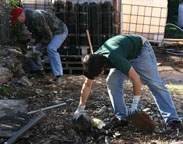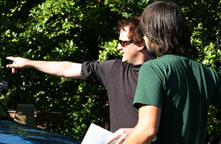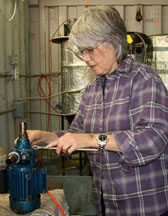|
November 7, 2006
GoBiodiesel Goes the Extra Mile
Global warming has changed more than the environment around the world; it has changed the minds of some people to work for countering its effects. While a growing segment of the public do their part in the marketplace by purchasing “green” items, one group in Portland is doing far more. The members of the GoBiodiesel Cooperative are not only showing that individuals can make a difference, but also are shaping an environmental and business model for the future.
By Sherry Harbert
Every Saturday morning, a diverse group of people form a work party outside of their regular careers. Only their choice in transportation was the same as reflected by the row of VWs parked at the site. The reasons and talents of the members of GoBiodiesel Cooperative provided far greater diversity with a unique model for both environmentalists and business. The weather on one October morning would justify any other kind of outdoor activity, but a retired Army officer, a musician and an engineer joined others at GoBiodiesel’s processor site in Southeast Portland to work for a cause. Some were busy clearing a section of old canisters, pulling out splintered wood and metal from a pile and carrying away chucks of old concrete. Others were busy inside a tin building pulling apart a pump that converts used vegetable oil into biodiesel.
The work is a passion for the members of the cooperative. Volunteers pick up used vegetable oil from Portland-area restaurants and bring it back to convert it at the site. The operation uses five-gallon jugs to collect the used oil. Most restaurants, like Fire on the Mountain in North Portland, set the jugs outside for pickup. Restaurant owners Sara Sawicki and Jordan Busch believe it’s a vital part of their overall business plan. It is an attitude more companies are infusing into their operations. It not only keeps the waste out of the landfills, but allows them to contribute to an alternative fuel industry.
GoBiodiesel Cooperative was founded by Brian Jamison in 2002. Jamison, who operates Blue Sky Oil, has long been an advocate of environmental issues. The cooperative is a separate entity that brings all of Jamison’s vision into a working model through education, production and use of the alternate fuel source. Even the cooperative’s website reflects Jamison’s vision with a “Wiki” structure that includes information on biodiesel and sources throughout the Portland area.
The benefits of the cooperative are many. Each member contributes time and energy into the process to qualify for purchasing biodiesel at a much lower price than the current market price. But more importantly, the members of the cooperative see their contributions to the environment and new business as an added benefit for the entire Portland area.
GoBiodiesel will be celebrating the benefits of “kicking the petro habit” at a Biodiesel Bash, Aug. 11. Portland City Commissioner Randy Leonard will be guest of honor. Leonard’s strong support for biodiesel is transforming the industry and the city. He even provides a list of stations selling biodiesel on his city website. Leonard recently traveled to Eastern Oregon to discuss growing canola seeds to produce biodiesel with the Pendleton Grain Growers (PGG) cooperative. To Leonard’s surprise, the PGG was already on board. PGG cutback many of its operations after the last drought and economic slump in 2002, but it left room to explore new ways of generating agricultural income. Last year PGG began crushing canola seeds to produce oil that was converted into biodiesel for heating oil.
Leonard’s deal with PGG to produce biodiesel is the latest push for opening the markets in alternative fuels, while also benefiting the state’s farmers. The growth in business and production is critical to meet Portland’s fuel mandate for next year. The city unanimously approved an ordinance requiring all diesel fuel in the city to contain a minimum blend of five-percent biodiesel and all gasoline to contain at least 10 percent ethanol. The ordinance goes into effect July 1, 2007.
Masters of Their Own Destinies
Six months may seem like a short time to gear up to the city requirements, but six months can bring a lot of growth if those working in the area are as committed as the members of GoBiodiesel. The cooperative’s site processor has only been in production for six months and already produces 200 gallons of biodiesel each week. According to the “Minister of Oil,” Eli Rosenblatt (collection coordinator) there are about a dozen restaurants contributing their used oil to the cooperative. Fire on the Mountain contributes the highest volume, while most others average 10 gallons a week.
Rosenblatt coordinates the Grease Masters Team of about 10 people to retrieve the oil around the city. The schedule isn’t regular, but that helps each member work it into their own schedule for the most efficient use of their vehicles. After all, wasting fuel to pick oil isn’t part of GoBiodiesel’s plan.
Rosenblatt said the cooperative is also looking to the future. He said collection is still ahead of processing, but he sees that changing in the future. “Now, we’re pretty quick to transfer the oil from the jugs to the barrels and then the processor,” he said. “We’re working on solving the long term use of the jugs. Someday, we’ll move to a system where we aren’t picking up five-gallon jugs.”
The cooperative’s board is discussing ways to grow wisely. One of those growth steps may include a truck with tanks to pick up the oil around the city. It’s still a long way before that can happen, but it’s the openness to ideas that allows members to explore and participate in a myriad of ways. Until then, volunteers pick up the used oil on their own.
Grease Master may not be the first term Jordan McCann of Portland would use to describe himself. McCann works as an Environmental Technician for the City of Portland and is a member of the Team Evil, a folksy ‘awkward’ rock band, as he calls it. Grease Master describes his commitment to the cooperative as one of the volunteers who regularly pick up used vegetable oil from area restaurants. Though only his second time at the site, he shared his enthusiasm about the cooperative with some hands-on work. For McCann, the cooperative was “the next logical step” in his professional and private life.
The concept of empowering the individual for such a global cause is reinforced in the entire structure of GoBiodiesel. For Kevin Wheeler, a retired Army officer, the cooperative appeals to his values. “It makes so much sense to convert all this old restaurant oil,” said Wheeler, taking a break from moving chunks of concrete. “As a retired Army officer, I’m tired of watching my troops doing their duty by following this civilian leadership,” he said, who expressed his anguish over what he sees as a less than admirable intent of the current leadership’s foreign policy. Wheeler staunchly supports the military, but sees oil as one of the missions now framing military action around the world. “I can never say their lives are wasted because of this civilian leadership,” he said, referring to dangers troops face today. “They’re doing what they should have to do for this country.”
Wheeler sees the cooperative as a small, but important part in lowering the nation’s dependence on foreign oil. Though it offers an immediate alternative to foreign oil, the cooperative’s focus is on the environmental, health and business aspects of their fuel source. During the cooperative’s first four years, Jamison and other members built a structure that would keep those ideals at the forefront with each step of their growth. Extensive research went into the benefits and drawbacks of biodiesel even before the cooperative produced its first gallon of fuel.
During the time GoBiodiesel was launched, Cheryl Edmonds, began attending forums offered by her employer, Hewlett-Packard. She said she recalled one speaker who talked about his work in making biofuels in his garage. His talk intrigued Edmonds. “I didn’t know of it before,” she said. “But after hearing this guy speak, I started thinking.” She said her first response came in the form of purchasing a diesel vehicle. But it would be several years later that her “thinking” would turn to action. As she read more about it and grew more aware of the nation’s energy policies, she was determined to do more. “I decided an individual citizen can make difference,” she said, working on a portion of a pump. “This is how I can make a difference.” She joined GoBiodiesel last spring.
Now a board member of GoBiodiesel, Edmonds is as close to the front line in the industry as she can be. Edmonds is part of the cooperative’s Mix Master Team. While the term sounds more hip-hop than fuel co-op, it represents the duties of those converting waste oil into biodiesel. The process is rather simple. Heat and two chemicals are used to cause a reaction to extract glycerin from the oil. Once it is removed, the pure oil left behind can be used directly in any diesel engine. That is why it is viable for individuals to make biodiesel themselves. But on any larger scale, a team is required to oversee and operate the production. Edmonds is proud of how the structure for the cooperative is working.
The Basics of Biodiesel
What makes biodiesel so feasible as an alternative fuel source is that it can be put directly into a diesel engine without any modifications. (Gasoline engines won’t work on biodiesel without some pricey changes that have kept that market with the ethanol industry.) Biodiesel can be used in any ratio to petro-diesel. Most popular blends are B20 and B99. The “B” simply means the blend of biodiesel to petro-diesel. Any ratio will work and any ratio, even with a small percentage of biodiesel helps lower toxic emissions.
What most people notice first from burning biodiesel is the smell, mostly like French fries or donuts. It may be one way to say that those food products are healthy, at least for the environment. One drawback is the perceived cost, but when considering the added mileage diesel engines get per gallon the overall cost is competitive. For those driving in cold climates, pure biodiesel gels, but using B80 or less solves that problem.
From a purely business potential, biodiesel is one of the most flexible fuel sources around. It can be made from waste oil or fresh crops. Canola and soy are the most used type of oil in the biodiesel industry. Some Oregon farmers are growing canola and soy strictly for the biodiesel market. Soy is popular because it is a marketable crop with the oil as a by-product of the soy meal industry. Other oils come from rapeseed, palm, coconut, hemp and algae. There’s even a study being conducted that shows potential for some weeds. The USDA’s National Center for Agricultural Utilization is working on extracting oil from pennycress. Pennycress poses a nuisance in wheat fields because it produces so many seeds. But, it is still a weed that can poison livestock, so it is only in exploratory stages.
GoBiodiesel members are quick to keep up with the news in the biofuel field. The “Wiki” structure to the cooperative’s website allows others to contribute information, but it is monitored for accuracy. The FAQ section provides pages of information for those curious enough to check it out. There’s also a section on the benefits and drawbacks of biodiesel.
Edmonds said Jamison’s vision has been a model for how a biodiesel cooperative should be and sees it being replicated by others in the future. “We’ve at least got the system working,” she said.
© 2006 Foreign Interest
For more information:
GoBiodiesel Cooperative: www.gobiodiesel.org
Portland Commissioner Randy Leonard: www.portlandonline.com/leonard/
Pendleton Grain Growers: www.pggcountry.com
Biofuels for Oregon: www.biofuels4oregon.com
Contact the author: sharbert@foreigninterest.com
|

